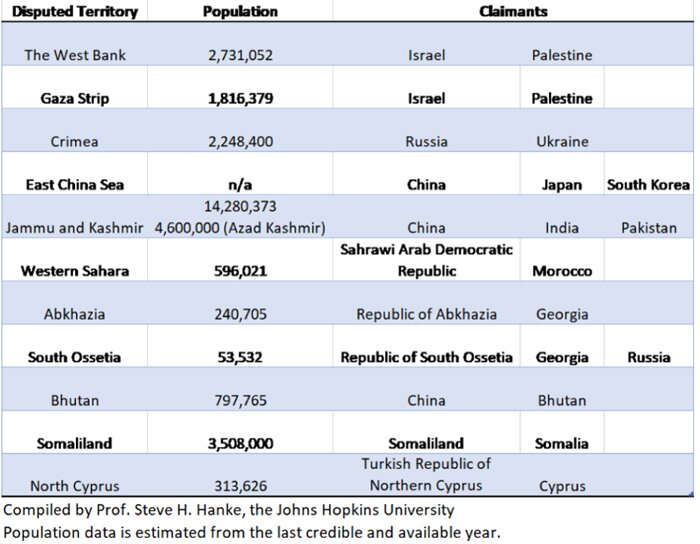The Thatcher government did not realize that danger was lurking, as is always the case when disputed territories are in the picture. Indeed, Britain’s intelligence about what Argentina’s military government was up to was wanting. When the Galtieri government struck, Britain was caught off guard and the Falklands War ensued, resulting in more than 900 casualties. And, as they say, what goes around comes around. As the preparations for next year’s G2O summit, which will be hosted in Buenos Aires, proceed, tensions are on the rise, yet again.
Before we have more nationalistic posturing, sanctions, protracted skirmishes, a new war, and only then a “solution,” let’s move the Falklands dispute out of what is mucha teología (many theological arguments) territory, try to think creatively and design market-based treaties applicable to dangerous disputed territories (see the accompanying table).
Dangerous Disputed Territories
For the Falklands, the governments of the United Kingdom and Argentina would agree that those Falklanders who were qualified to vote would be allowed to do so in a referendum. The referendum would allow the settlers — who are English-speaking and English by custom, institutions and loyalties — to vote on whether they prefer the status quo, or whether they would agree (“yes”) to an Argentine take-over. A super-majority “yes” vote, of say 80%, would be required by the Falklanders to allow Argentina to claim sovereignty.
This is where markets come in. The Falklanders would have to be compensated by Argentina. The referendum would be designed so that Argentina could offer a cash incentive. Before the referendum, Argentina would deposit an amount (let’s say USD $500,000) in escrow, in Swiss bank accounts for every man, woman and child who had proven their Falklands residence prior to the referendum. If the referendum went in Argentina’s favor (over 80% of eligible voters casting a “yes” vote), then the funds in escrow would be transferred to the Falklanders, and Argentina’s unambiguous sovereignty over the Falklands would be established. Argentina’s cost, in this hypothetical, would be about USD $1.6 billion.
A transparent market solution for the Falklands and other disputed territories would be a cost-effective way to unambiguously establish sovereignty — a way that avoids blundering into unwanted wars and spilling blood, sweat and tears.

